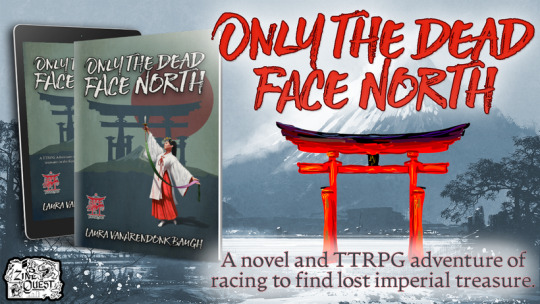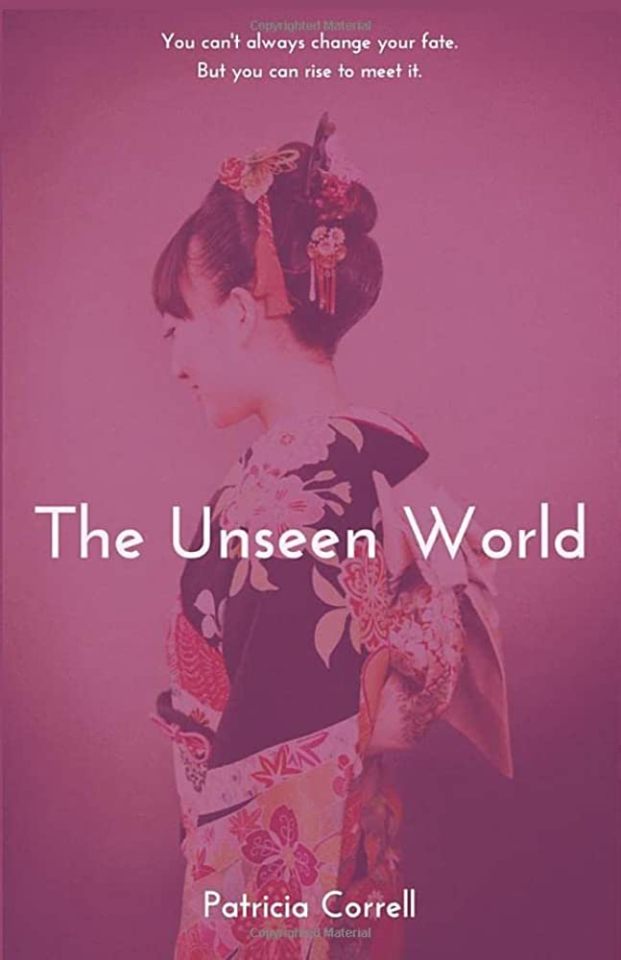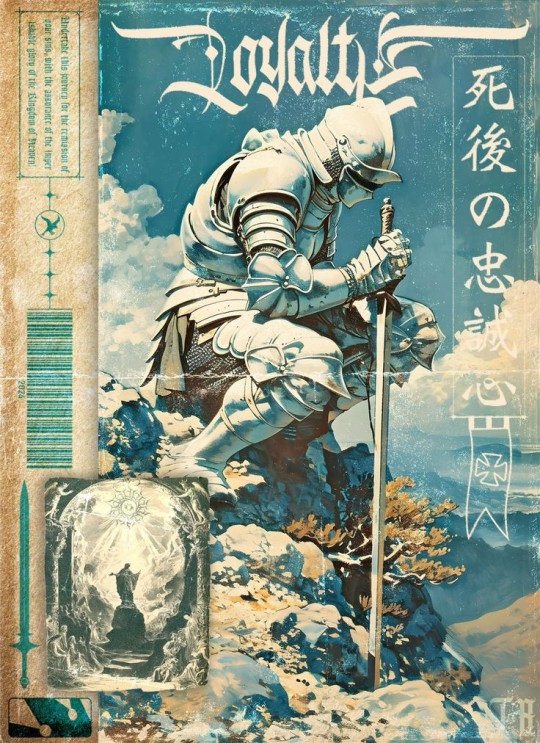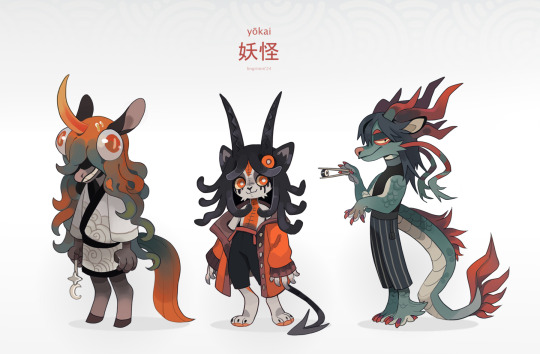#japanese fantasy
Explore tagged Tumblr posts
Text

Between Realms
Tools used:
Checkpoint: Jib Mix Realistic XL-v16.0 Aphrodite EclecticEuphoria Universal SD3_k4 black-forest-labs/FLUX.1-dev
web-ui: stable-diffusion-webui (AUTOMATIC1111) stable-diffusion-webui-forge ComfyUI
Other: Photoshop
#Between Realms#fantasy art#digital art#magical realism#mystical vibes#dark fantasy aesthetic#ethereal beauty#otherworldly#fantasy landscape#digital illustration#beautiful darkness#mythical#celestial magic#mystical forest#oriental fantasy#dark elegance#japanese fantasy#dreamlike#spiritual journey#surreal beauty#visual storytelling#cherry blossoms#divine feminine#ancient magic#fantasy character#soft magic#enchanted forest#aesthetic art#fantasy scenery#mystic aura
4 notes
·
View notes
Text
ONLY THE DEAD FACE NORTH is alive!
It's aliiiiiiiiiivvveeee!

Please check out my first Kickstarter, bringing out the next in my Kitsune Tales series with an accompanying tabletop roleplaying game adventure.
Emperor Kazan ascended to the throne at the age of 17. At the age of 19, he abdicated by night and took religious orders at a nearby temple. This much is historical fact. Two centuries later, humans and yōkai race to find the lost imperial treasure allegedly hidden by Kazan along an ancient pilgrimage route, amid competing loyalties and navigating dangerous politics in both religion and government.
Click here: http://kck.st/3SHgQp5

#writblr#historical fantasy#ttrpg#kickstarter#japanese fantasy#japanese history#fantasy#books#writers#writers on tumblr
7 notes
·
View notes
Text
My review of “The Sword of Kaigen”
Since no one warned me, I’m here for the people! DO NOT READ THIS BOOK UNLESS YOU HAVE A FULL DAY TO YOURSELF! I MEAN IT!
(Spoilers ahead sweetie)
I started reading this book as I usually do, all happy and excited to enter a new world but then, the worst enemy of any reader came to visit- Life! And this isn't the kind of book you can read while doing your everyday activities , oh no sir, because then you'll find yourself crying your eyes out on a bus on your way to work and trust me, it is as embarrassing as it sounds.
I started the book completely blank, aside from the awesome reviews I had read. They said this book was the best they’d ever read and that it was completely underrated. As the pretentious little book reader that I am, I wanted to judge for myself. Frankly, I think "The Sword of Kaigen" is a really well-made and thoroughly thought-out story!
I saw that the author started writing this series when she was twelve, so it's no wonder she knew her characters inside and out. Each character had unique traits that made them well-developed individuals. None of them were perfect, and I often found myself frustrated with their behavior, but their imperfections made them feel more human to me, rather than just words on a page.
The world-building of the story had some issues. I noticed some plot holes and unrealistic settings that bothered me. For example, the story was set in a place that seemed like the Tokugawa Period but included electricity. This seemed contradictory as I expected the setting to be more advanced and modern. Additionally, there was a TV in the characters' home, but none of them had phones or computers, which seemed odd.
Another issue was with the whole Emperor plot. The Matsudas were the reason the Emperor could continue to rule, yet he still treated them poorly even after they were nearly wiped out. I understand that it was a way to show how the emperor didn't care about his people, but I expected at least a bit of political hypocrisy where they would be publicly thanked, ensuring the soldiers' unconditional loyalty to the government by providing them with goods and services Bluh bluh bluh.
In my opinion, the relationships are the reason this book was so good- the children, the mothers, the newly formed family. The redemption arcs and the bond between mother and child that has shattered my heart.
(I am not lying, I literally cried for an entire hour and couldn't function normally the next day).
It was then I realized that M.L. Wang was no ordinary author. She had a way of tugging at your heartstrings and manipulating them at will. I felt like a puppet in her Avatar-like story, and I don't think I'll ever recover. The grief was so intense that it was agonizing for me to continue reading and see how everyone coped after losing such an important character whom I had grown to love within 200 pages when there are characters I can't seem to like after two whole books!
I want to mention that the fight scenes were incredibly well-written and detailed. I typically skip battle scenes in books because I find it hard to imagine them, but M. L. Wang's descriptions were so vivid and thorough that I felt like I was right there fighting alongside the characters. Amazing writing.
I am genuinely curious about the future M. L. Wang envisioned her characters however, it is uncertain when we will get more books from this world she has created.
In the meantime. I will read the rest of the books she has published and will wait patiently for her inspiration to resurrect.
5 notes
·
View notes
Text
Fantasy throughout the world
On top of having an article centered around the French fantasy specifically, the "Modern Success" issue of the BNF Fantasy series also has an article (again written by Anne Besson) covering the topic of "Fantasy throughout the world". Here is, once again, a rough translation by your humble servant:
While heavily dominated by an English-speaking production, fantasy literature found its place in numerous European countries, and managed to cross several continents.
Born in England, grown in parallel on the two sides of the Atlantic oceans, and becoming a mass-phenomenon in the United-States, fantasy is without a doubt an anglophone genre. Even today the fantasy market has a MASSIVE unbalance, and the modern fantasy successes prove that the mondialization of the imaginations is dominated by the cultural superpower of the USA. But ever since the 1970s, as the translations of Tolkien spread across the world and role-playing games conquered the heart of teenagers, "native fantasies" started to appear in various European languages.
German fantasy is a good example of one of those "local takes" - it does help that Germany has a literary background including the Romantic movement, and the brothers Grimm fairytales. After the enormous success of Michael Ende's Never-Ending Story in 1979, the German fantasy did not stop. Many successful authors appeared. Wolfgang Hohlbein gained an internal fame, with his 1982 Märchenmond or his 1999's Chronicles of the Immortals. Cornelia Funke was a famous German youth author, with her trilogy "Inkworld" in 2003. Kai Meyer reworked Germanic legends in his 1998's Loreley or his 2001's Nibelungengold. Walter Moers created the continent of Zamonia, and popularized the character of Captain Blue-Bear (hero of a 1993's children television show, of two novels, and of a 1999's movie).
But very often, international fame only latches on one specific author that is well-known outside of their country's frontiers. In Poland, this author would be Andrzej Sapkowski with his 1986's Witcher series, adapted in 2007 as a video game, and in 2019 as a television series). In Spain, it would be Javier Negrete with his 2003's Tramorea.
Crossing the continents, it becomes very tempting to mix together the magic of fantasy literature with specifically cultural supernatural domains - the Hindu pantheon, the Chinese ghost stories, the kami and the yokai of Japan, the witchcraft of Africa or the Caribbean Isles...
South-America is rich of a literary tradition that in France we compare to our own "fantastique": the short stories of Argentina's authors Jose Luis Borges or Adolfo Bioy Casares in the 40s, the magical realism of Alejo Carpentier in Cuba (The Century of Lights, 1962), of Gabriel Garcia Marquez in Columbia (A Hundred Years of Solitude, 1967) or Carlos Fuenta in Mexico (Terra Nostra, 1975).
On the side of the African continent, The Road of Hunger, in 1991, by Nigerian author Ben Okri, is also part of this more "legitimate" current, a form of fantasy much closer to "general literature", but there is a new African generation, dominated by English-speaking women (Nnedi Okorakor, Nisi Shaw, Lauren Beukes) that fully appropriate and absorb the fantasy genre.
Up until a very recent date, it was considered more respectful to not assimilate these works, born of very different cultures, with a genre that is both modern and Anglo-Saxon. However, the numeric world and the mondialized economy have today destroyed a lot of cultural frontiers, and today we assist to a true "meeting of the imaginations" mixing various cultures together. The author of this article mentions as an example several works coming from East-Asia: the Japanese manga Full Metal Alchemist by Arakawa Hirowu, the other Japanese manga Witch Hat Atelier, or the Sino-American movie The Great Wall (2016).
#fantasy literature#foreign fantasy#fantasy references#fantasy novels#german fantasy#non-english fantasy#polish fantasy#spanish fantasy#african fantasy#european fantasy#japanese fantasy#fantasy throughout the world
11 notes
·
View notes
Text
Descendant of darkness, this is your fate. That which you seek will never be found. The night will eat your heart and you will wander the darkness for a thousand years.
Kylie Lee Baker, The Keeper of Night
#The Keeper of night#The Keeper of night spoilers#Kylie Lee Baker#Japanese fantasy#Book quotes#book quotes#Quote#Fantasy quote
2 notes
·
View notes
Text
Kunitsu-Gami seems to be exactly the type of action game out of the mainstream gaming industry I’ve been eager for lately. A Shinto-influenced Mythological Fantasy setting that steps away from straight up and down western medieval fantasy, one part plate-spinning Tower Defense + one part flashy character action, and an Original IP not locked to the current obsession with live service elements or always online requirements which gaming execs have drooled over the past near decade. Shot up to the top of my wishlist after the Gameplay Overview Trailer:
youtube
In many ways, like Hi-Fi Rush before it, it injects a similar bit of hope in me for at least a part of the AAA gaming industry that hasn’t been sapped away through tripe like Kill The Justice League, Marvel Avengers, Starfield, Gotham Knights, AC Valhalla, Skull & Bones, Silent Hill Ascension etc. I’ve got nothing but kudos to grant Capcom for both this & Dragon’s Dogma 2!
#capcom#kunitsu gami#kunitsu gami: path of the goddess#kunitsu-gami#video games#Shinto#Shinto mythology#Japanese fantasy#hi fi rush#japanese mythology#gaming industry#character action games#action games#tower defense#tower defense games#original ip#suicide squad ktjl#Ubisoft#bethesda#starfield#aaa gaming#aa gaming#Konami#skull & bones#Youtube
3 notes
·
View notes
Text

Kiki's Delivery Service - Eiko Kadono
Translation: Emily Balistrieri
Read: Apr 2023
I really, really love the Studio Ghibli film of this book. So when I saw the book in a local book store I jumped at it. I was very interested to read the source material. Now Kadono wrote this for her young daughter so it is truly a children's book. The flavour of it is different than the film, but the similarities are still there. There is a lot more material in the book and a lot of it felt childish. I guess that was to be expected from a children's book. It has been so long since I read a children's book that I'm not really used to reading writing for children. I enjoyed this book, it was fun to read, but in the end I felt the film did a better job with the story and with the character of Kiki.
Info: Yearling, 2020; originally: Majyo no Takkyubin, Fukuinkan Shoten, 1985
10 notes
·
View notes
Photo

Nekkyo Usagi Art (c) 2023 - ARTSTATION | INSTAGRAM | KO-FI
#nekkyousagiart#character design#my ocs#some old friends from a lifetime ago#original characters#kitsune#anime boys#okaeshi#japanese fantasy
8 notes
·
View notes
Text
Book Review - The Unseen World by Patricia Correll
@Author_PCorrell takes us on a fantastic journey through a fantastic Japanese fable where the onmyouji ply their trade, kappa snatch travelers, and the tengu might help you. This week on my #wordpress #blog
The urban fantasy world is rife with stories of young people with untapped potential. Frankly, it’s a trope I really enjoy, so I can’t diss anyone who makes use of it. Besides, even the Good Book (not Starship Troopers, the other one) said there is nothing new under the sun. And, let’s face it, that book was written a long, long time ago and has been riffed on a lot over the years. So, you’ve got…

View On WordPress
2 notes
·
View notes
Text
忍者の漫画、第9話を公開しました!
0 notes
Text
I am preparing my first Kickstarter!
Kazan became emperor in AD 984, at the age of 17. He was coerced into abdicating the throne at 19. He then took religious vows and became an itinerant monk until his early death.
This much, according to historical texts, is true.
What happened next is yours to discover.
In Only The Dead Face North, humans and yōkai race to find a lost imperial treasure, believed to have been hidden by Kazan along the Kumano Road pilgrimage route. Stakes are high as they compete not only for the inestimable value of the cache itself, but for the prestige of its discovery and its delivery to the politically-charged court of the shōgun.
This is a novel and a corresponding TTRPG adventure, moving through the same story from different perspectives. Novel and game function independently, so readers and players can enjoy each as a standalone or together for a fuller tale.
While remaining mostly true to known history, the Kitsune Tales are fantasy. The stories currently average 4.4 stars in reviews on Amazon. They are written by a nerd; you may have heard my educational talks on Japanese history or folklore at a con, library seminar, or other event! I had the opportunity to hike my own pilgrimage on the Kumano Kodō in late 2022, and that experience inspired the development of this story and setting. As an enthusiastic history nerd and fantasy author, I love to incorporate real world detail when I can to add depth to fictional realms.
Please follow the project or share with a friend who might like it, and thank you for supporting indie creators!
#indie ttrpg#ttrpg#japanese fantasy#japanese history#historical fantasy#indie author#pathfinder#dungeons and dragons#Baby's First Kickstarter#l5r#am writing fantasy#legend of the 5 rings#writing#history#wip#kumano#kumano road#kumano kodo#authors#authors of tumblr#am writing#fantasy#writers#books#writing community
5 notes
·
View notes
Text

#studio ghibli#spirited away#anime#gif#neon city#neon glow#japanese town#city lights#city aesthetic#ghibli films#anime gif#film gifs#movie gif#screencaps#ghibli#anime art#ghosts#spirits#lanturn#2000s movies#2000s nostalgia#2000s films#rain#rainy#summer storm#spring rain#vintage city#cityscape#magic#fantasy
4K notes
·
View notes
Text

Art by T. Edward Reyes 🩵🗡
#knight#knightcore#royalcore#medieval#art#magazine#pulp art#traditional art#fantasy#snow#japan#japanese art#crusade#armor#nature#sword#chivalry#loyalty#honor
2K notes
·
View notes
Text

Yokai random designs!
#yokai oc#art#artist on tumblr#japanese#monster art#characters concept#anthro#fantasy#Can you see a black octopus cat in the middle guy's hair?#Thats on purpose#Yokai by lingrimm
3K notes
·
View notes
Text

Sephiroth [Final Fantasy VII] by TsuyaNoUchi
https://tsuyanouchi.etsy.com/
#sephiroth#final fantasy 7#final fantasy vii#ffvii#ff7 fanart#ff7#final fantasy#anime#anime art#anime fanart#anime and manga#manga#ukiyoe#edo period#japanese art#tsuyanouchi
936 notes
·
View notes
Text







Nutcracker Fantasy (1979)
#nutcracker fantasy#the nutcracker fantasy#nutcracker fantasy 1979#takeo nakamura#sanrio#fantasy#ballet#suspiria#japanese
738 notes
·
View notes